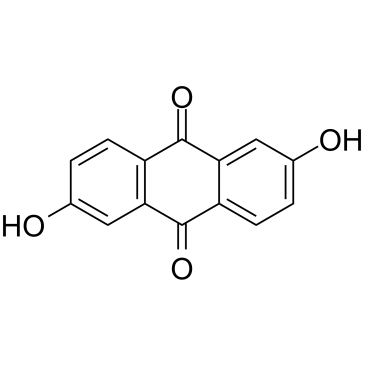Anthraflavic acid inhibits the mutagenicity of the food mutagen IQ: mechanism of action.
A D Ayrton, C Ioannides, R Walker
Index: Mutat. Res. 207(3-4) , 121-5, (1988)
Full Text: HTML
Abstract
The ability of anthraflavic acid to inhibit the mutagenicity of IQ was investigated using the Ames test and employing hepatic activation systems from Aroclor 1254-pretreated rats. Incorporation of anthraflavic acid into the S9 mix caused a concentration-dependent decrease in the mutagenicity of IQ. A similar effect was seen when microsomes only were employed as activation systems. Cytosol, as we have previously demonstrated, potentiated the microsome-mediated mutagenicity of IQ and this potentiation was also inhibited by anthraflavic acid. In contrast, anthraflavic acid had no effect on the mutagenicity of the direct-acting microsome-generated metabolites of IQ. It is concluded that anthraflavic acid is a potent inhibitor of IQ mutagenicity by virtue of its ability to inhibit both its microsomal and cytosolic activation pathways.
Related Compounds
| Structure | Name/CAS No. | Molecular Formula | Articles |
|---|---|---|---|
 |
2,6-DIHYDROXY-ANTHRAQUINONE
CAS:84-60-6 |
C14H8O4 |
|
Phytoestrogens from the roots of Polygonum cuspidatum (Polyg...
2001-07-23 [Bioorg. Med. Chem. Lett. 11(14) , 1839-42, (2001)] |
|
Mutagenicity of anthraquinone and hydroxylated anthraquinone...
1982-06-01 [Appl. Environ. Microbiol. 43(6) , 1354-9, (1982)] |
|
A compact optical instrument with artificial neural network ...
2012-01-01 [Sensors (Basel.) 12 , 6746-63, (2012)] |
|
High mobility emissive organic semiconductor.
2015-01-01 [Nat. Commun. 6 , 10032, (2015)] |
|
Exceptional activity of tannic acid among naturally occurrin...
1988-05-01 [Cancer Res. 48(9) , 2361-5, (1988)] |